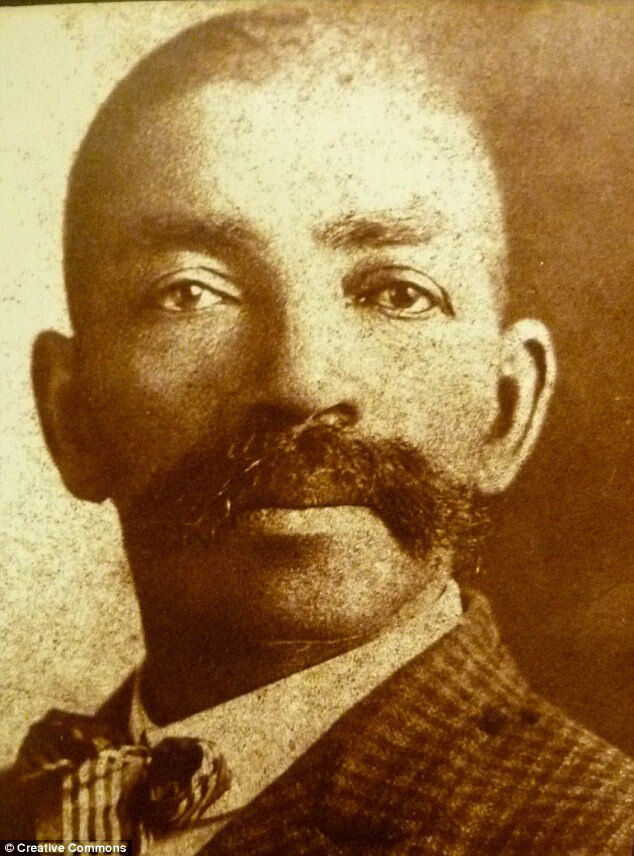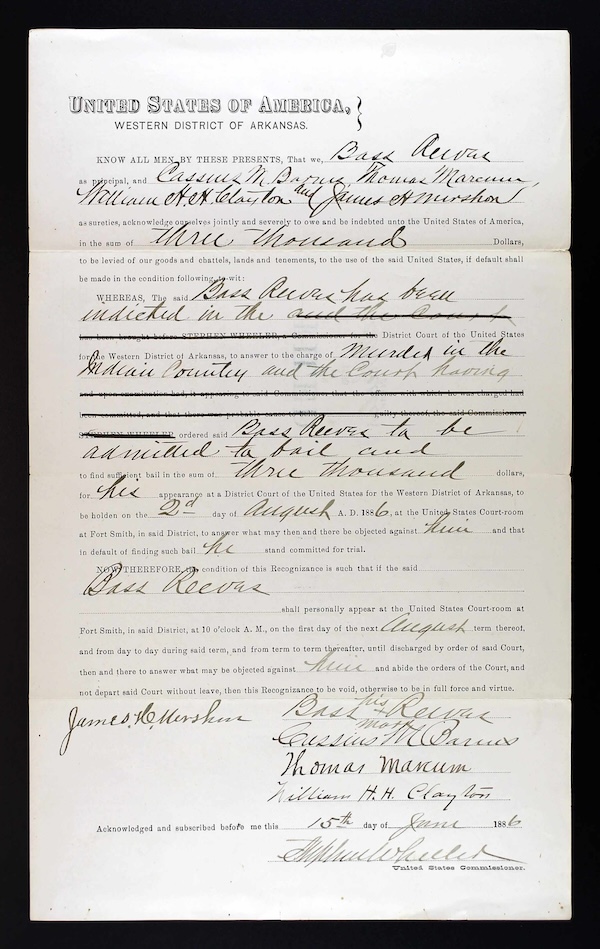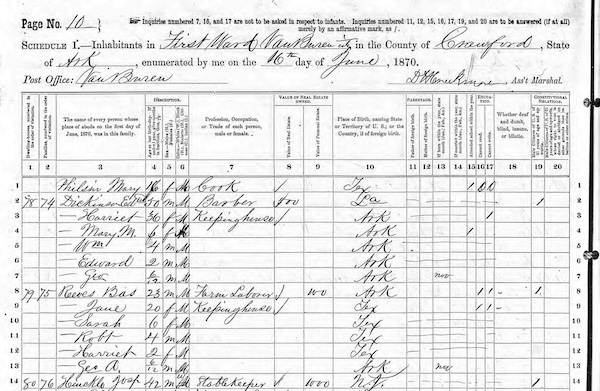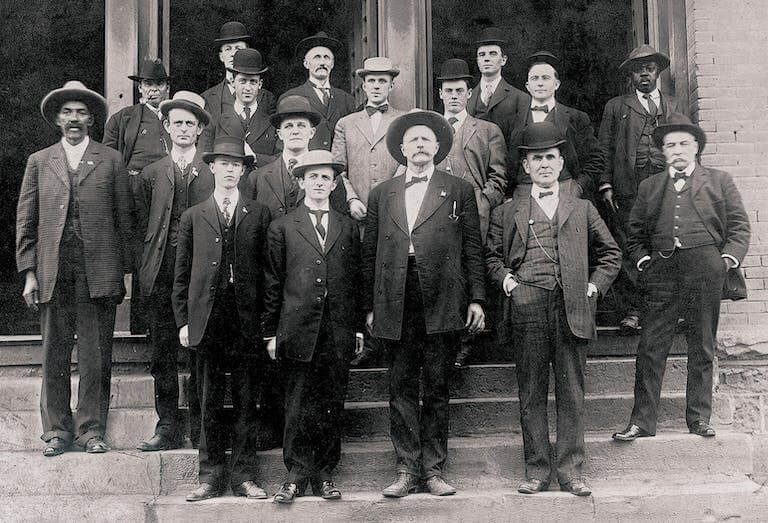- Home
- Family Tree and Family History
- The Bass Reeves Story
The Bass Reeves Story
The Bass Reeves Story is about a legendary lawman and frontier hero who made a name for himself in the American West during the late 19th century. Born into slavery in Arkansas in 1838, he grew up in Texas and fought in the Civil War before making his way to Oklahoma, where he learned the ways of the Native American tribes and became an expert in firearms. In 1875, he was recruited by US Marshal Fagan to work in the Western District Court for Arkansas in Fort Smith, where he quickly became one of the most successful and feared lawmen in the region.
 Bass Reeves
Bass ReevesThroughout his 32-year career as a deputy US marshal, Bass Reeves captured over three thousand criminals, including some of the most infamous outlaws. He was known for his impeccable marksmanship, his masterful use of disguises, and his ability to outwit and outmaneuver even the most dangerous fugitives. He was also known for his strict adherence to the law and commitment to justice, even in the face of racial prejudice and discrimination.
Despite his challenges as a black man in a profession dominated by white counterparts, Bass Reeves never wavered in his dedication to his job or community. He was a respected and admired figure in the American West, and his legacy continues to inspire and captivate people today.
The Bass Reeves Story - Humble Beginnings
Bass Reeves was born into slavery on the estate of William S. Reeves in Crawford, Arkansas, in 1838. Later, when William Reeves moved to Texas, he went with him and grew up there. He was known for his good manners and sense of humor. His life changed during the American Civil War when he went into battle with William Reeves' son, George Reeves, as his bodyguard and companion. This experience would shape his future and lead him to become one of the most respected lawmen in the Wild West.
Leaving the Past
After leaving Reeves's household, it is still being determined what exactly transpired between Bass and George. Some say it was due to a game of cards. In contrast, others believe that the Emancipation Proclamation of 1863 was reason enough for him to leave. Regardless, the war allowed Bass to leave behind a past of enslavement, which he took at the first chance.
Bass made his way into Oklahoma, still occupied by Native American tribes. He learned the customs and languages of tribes like the Cherokee and the Seminole. He became skilled in tracking living beings through the terrain. Bass used his knowledge to guide government officials who ventured through the land and trained himself to become an expert in firearms, particularly the pistol.
Living with the Native Americans allowed Bass to leave behind his past and start a new life. He embraced their culture and learned valuable skills that would serve him well in the future.
US Marshal Bass Reeves
Bass Reeves was born into slavery in 1838 but gained freedom after the Civil War. He settled in Arkansas, where he married and had ten children, becoming a successful farmer.
Reeves' reputation as a skilled tracker and marksman led him to work with white Marshals in Indian Territory, helping them track down outlaws. In 1875, he was hired by Judge Isaac Parker to work as a Deputy US Marshal in the Western District Court for Arkansas in Fort Smith, known for its high volume of criminal cases and liberal use of the death sentence.
As a Deputy, Reeves patrolled the whole Indian Territory in Oklahoma and Arkansas, capturing some of the most notorious outlaws of the time, including Bob Dozier and Greenleaf. His biographies are filled with tales of exciting exploits and dangerous encounters.
Reeves' expertise in Indian tribes made him a valuable asset to the Marshals Service, and he quickly rose through the ranks to become one of the best Deputies in the area. By the end of his 32-year career, he had caught over three thousand criminals, one of the highest records for any US Marshal.
Despite his impressive record, Reeves' legacy was largely forgotten until the 20th century, when historians began to uncover his story. Today, he is celebrated as a trailblazer and a symbol of justice in the Wild West.
Fearsome Reputation
Standing at six feet and two inches tall, with a lithe yet imposing frame, he was known for his high success rate, many times that of his white counterparts. Despite the danger of his job, he was always well-dressed, with meticulously polished boots, and always maintained his dignity.
Bass Reeves was a master of disguise, which proved invaluable in apprehending criminals. He was often seen on his horse, with three guns at all times. He was adept at using revolvers with both hands, and his go-to weapons of choice were a Colt pistol and a Winchester rifle. Most famous of all his exploits is apprehending a pair of brother outlaws by posing as a fellow criminal to their mother.
His place as the best Marshal in the country was undisputed, and newspapers from all over the region hailed him as the terror of the lawless in the West. His race or origins had little bearing on how his success was acknowledged.
Bass Reeves was committed to his duty as a Marshal, even at a personal cost. In 1902, his son murdered his wife and ran away, escaping the wrath of the law. The warrant for his son's arrest moved from desk to desk among the other deputies, who were too hesitant to take it up while Bass was away. When he returned, he saw the warrant and asked for it in a soft voice, bearing the responsibility for bringing his son in. After being sentenced to imprisonment, he succeeded, and his son was later released on good behavior.
Challenges to His Esteemed Reputation
In 1887, Reeves faced a legal battle that many historians believe was racially motivated. He was charged with the murder of his cook, an incident that had occurred several years prior. The timing of the charges, coming late in his career, suggests an effort to tarnish his well-regarded name.
For his defense, Reeves enlisted the help of W.H.H. Clayton, a reputable former U.S. Attorney and a personal friend. Clayton successfully argued Reeves' innocence, no doubt bolstered by Reeves' impeccable record in law enforcement. Despite the acquittal, the trial had financial repercussions, forcing Reeves to sell his expansive residence and move to a smaller home.
 United States vs Bass Reeves charged with murder of his cook, 15 June 1886.
United States vs Bass Reeves charged with murder of his cook, 15 June 1886.Final Chapters and Legacy
Upon retiring from his marshal duties in 1907, Reeves' health started to decline. He took on a brief role as a city policeman in Muskogee, Oklahoma, before passing away at 71 on January 12, 1910, due to Bright's disease, a kidney ailment.
 Bass Reeves and family US Census - 15 June 1870
Bass Reeves and family US Census - 15 June 1870Reeves had two marriages and fathered 11 children. His first wife, Nellie Jennie, passed away in 1896. He later married Winnie Sumter in 1900, who outlived him. Reeves' impact endures through his numerous descendants and the tales of his remarkable career as a pioneering lawman in the American West.
Bass Reeves' fearsome reputation, cunning and disguise, adoration and praise, commitment to duty, and ability to overcome illiteracy and other challenges make him a remarkable figure in American history.
Questions About The Bass Reeves Story
What were Bass Reeves' most significant accomplishments as a lawman?
Bass Reeves was a legendary lawman who served as a Deputy U.S. Marshal in the late 1800s. He is known for his bravery, sharpshooting skills, and ability to bring in some of the most dangerous outlaws of his time. Reeves is credited with arresting more than 3,000 criminals during his career, and he was never once wounded in the line of duty. His most significant accomplishments include capturing notorious outlaws such as Belle Starr and Bob Dozier and bringing law and order to the Indian Territory.
Where did Bass Reeves live during his law enforcement career?
Bass Reeves lived and worked in the Indian Territory, which is now part of Oklahoma, during his law enforcement career. He was appointed Deputy U.S. Marshal in 1875 and worked in the territory for over 30 years. Reeves was responsible for maintaining law and order in a region known for its lawlessness and violence.
 Bass Reeves (far left), at age 69, posing with fellow members of the U.S. Marshals Service on the first day of Oklahoma statehood, November 16, 1907.
Bass Reeves (far left), at age 69, posing with fellow members of the U.S. Marshals Service on the first day of Oklahoma statehood, November 16, 1907.What is the story behind the upcoming Bass Reeves movie in 2023?
The upcoming Bass Reeves Story in the movies in 2023 is based on the life of the legendary lawman. The movie will tell the story of Reeves' rise from slavery to becoming one of the most respected lawmen of his time. It will also highlight his bravery, sharpshooting skills, and ability to bring in some of the most dangerous outlaws of his time.
What was Bass Reeves' upbringing like?
Bass Reeves' parents were enslaved, and he was born into slavery in Crawford County, Arkansas, in 1838. Reeves' upbringing was difficult, and he was forced to work on his owner's plantation from a young age. However, his owner taught him how to hunt and shoot, later proving valuable skills during his law enforcement career.
How did Bass Reeves become a free man and begin his career in law enforcement?
Bass Reeves became a free man after the Civil War ended in 1865. He then moved to Arkansas, where he became a successful farmer and rancher. Reeves was later appointed as a Deputy U.S. Marshal in 1875, which marked the beginning of his long and successful career in law enforcement.
Is the Bass Reeves story based on a true story, and what are the historical facts behind it?
Yes, the Bass Reeves story is based on a true story. Reeves was a historical figure who served as a Deputy U.S. Marshal in the late 1800s. He is known for his bravery, sharpshooting skills, and ability to bring in some of the most dangerous outlaws of his time. The historical facts behind his life and career are well documented, and he is widely regarded as one of the most successful law enforcement officers of his time.
Was the Lone Ranger figure based on the Bass Reeves story?
Some evidence suggests that the Lone Ranger figure was based on Bass Reeves' life. The creators of the Lone Ranger character have never confirmed this, but there are several similarities between the two figures. The Lone Ranger and Bass Reeves wore masks, rode white horses, and were known for their bravery and sharpshooting skills. However, it is important to note that the Lone Ranger is a fictional character, and his origins are the subject of much debate among historians and pop culture enthusiasts. The Bass Reeves story is one that everyone should know.












